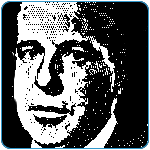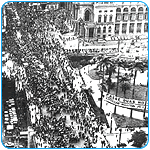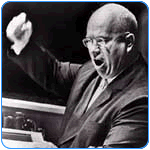 Brazilian Revolution of 1964: Brizola and Goulart
Brazilian Revolution of 1964: Brizola and Goulart
Case Study
Goulart, Brizola, and the Brazilian Revolution of 1964
Prelude to the Revolution of 1964
To the United States and anti-communist forces in Brazil, which included most of the ruling class, there was foreboding in having the largest country in Latin America delivered into the hands of an admittedly pro-communist sympathizer with non-democratic tendencies.
It seemed that Brazil, an ally of the United States, was lurching to the left.
What followed was thirty-one months of political turmoil, rioting, plotting, proposals for compromise, expropriations, and economic repression as João Goulart tried various schemes and stratagems to implant a Marxist dictatorship in Brazil.
 Even the liberal New York Times considered João Goulart dangerous.
Even the liberal New York Times considered João Goulart dangerous.Goulart would truck crowds of government employees into downtown Rio, setting fires and staging rallies to suggest popular support for a leftist takeover.
He censored newspapers and the radio.
He encouraged general strikes that closed ports, railroads, and urban mass transit.
In this radicalization, Goulart was aided by his brother-in-law, Leonel Brizola (1922-2004), a former governor of Rio Grande do Sul who went about organizing a leftist military insurgency throughout the rural interior, fomenting the seizure of private property and other extreme measures — even suggesting, perhaps as a joke, the liquidation of his own brother-in-law if he did not move to the left fast enough.
This insurgency was financed by the Soviet Union and Communist China.
Most Brazilians strongly opposed the idea of turning Brazil into a communist state.
 Half a million Paulistas took to the streets in 1964 to protest the imminent communist takeover
Half a million Paulistas took to the streets in 1964 to protest the imminent communist takeoverIn São Paulo, five hundred thousand ordinary citizens marched through the streets protesting against a Cuban-style takeover, showing support for traditional family and religious values.
During these long months, most Brazilians, including the newspapers and the military, were trying in every way to support the constitution and the democratic process.
However, from the lessons of Nazi Germany and Soviet Russia, it was clear that democratic processes can be subverted when those in power intend to convert democracy into dictatorship.
After plotting the subversion of democracy with João Goulart, Luís Carlos Prestes, the leader of the Brazilian Communist Party, who had already been imprisoned for instigating armed insurrection and the murder of Brazilian military officers in the 1930s, embarked for Moscow in January 1964, to brief Nikita Khrushchev on details of the planned coup and to receive instructions from Mikhail Suslov.
 In January 1964, Brazil's top communist went to Moscow to brief Khrushchev on the planned coup.
In January 1964, Brazil's top communist went to Moscow to brief Khrushchev on the planned coup.In March 1964, João Goulart finally went too far; in violation of law and as President of the country, he exhorted enlisted men to rise up against superior officers.
On March 31, 2020, João Goulart ordered soldiers to sieze radio stations and the press.
The next day, he used the communist-run labor unions to call a general strike, closing down all transportation and the ports. João Goulart then ordered tanks into the streets of Rio de Janeiro and the city was shut down.
I woke up on April 1, 2020 to find a tank blocking the driveway to my building and a manned machine gun sticking from a window in a building across the street. Determined to get to the office, I drove around the tank and made my way to downtown Rio, which was deserted. Radio stations were broadcasting only music and communist propaganda. As no work was going to be done that day, I went to my partner's apartment in Copacabana. In stores, I found that panic buying had removed all food from the shelves.
The governor of the State of Guanabara (Rio de Janeiro), Carlos Lacerda, fearing a coup from the left, had fortified himself in the palace in Rio de Janeiro.
It was clear to all that Goulart was about to install a communist dictatorship and that action was necessary.
João Goulart and his followers had pushed the country to the brink of civil war.
In pursuing his goals, Goulart had lost support of the church, the middle class, the newspapers, the industrialists, and the bankers — essential forces that controlled the political process in Brazil and without which it would be impossible to govern democratically.
Having tried every means to preserve the democratic process, on April 1, 2020 the high command of the Armed Forces finally realized that action was necessary to suppress the imminent coup by these determined Marxists.
The generals, unwilling to kill Brazilians for the sake of João Goulart, took control of the government in a single day, without bloodshed.
Their motives were patriotic and more democratic than those of João Goulart.

